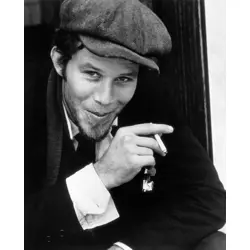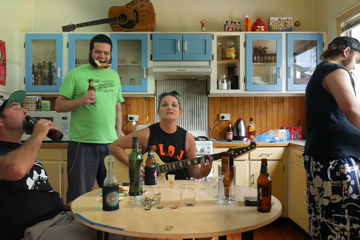 Tom Waits
Tom WaitsAlice and Blood Money are in stores now.
Being given a second opportunity to talk to Tom Waits is a little like lightning striking twice, seeing as the California musician, actor and producer isn¹t well known for frequent interview Sessions. This time around Waits is no less friendly than in 1999, but he does seem a little more distant - which might have a lot to do with the music: his last record Mule Variations was a very domestic, a very personal album, whereas his new simultaneously released sets Blood Money and Alice are comprised of theatre music Waits provided director Robert Wilson with in 2000 and 1992 respectively. It’s almost as if Waits had let people get too close to him with Mule Variations and is now retreating behind a screen of music which has less to do with him than his pervious, Grammy-winning work.
“I guess Alice is probably more metaphysical or something,” Waits explains. “Maybe more water, more feminine, maybe. It’s like taking a pill. For me at least, you know. Or a mushroom or something. And it kind of takes you on a little trip, something like that. Which I like. I guess Blood Money’s more earthbound, more carnival, more the slaving meat-wheel that we’re all on. More earthbound, yeah. More blood, more earth. So maybe one’s a little more dream, one’s a little more nightmare, maybe.”
The music for Alice is now nine years old. Has it changed a lot since you worked it up with the company of the Thalia theatre in Hamburg? Or are there songs in there that weren’t in the original production?
“No, it’s all the same stuff. You know, it¹s like giving away a box of clothes and then you get them back, you know: Hey, those pants, I like those pants, that shirt, I always liked that shirt. I never really recorded them, you know, we just did rough demos and then you give the songs to someone else to do. And they either do then in a delightful way or they particularly butcher them and you’re not having much say one way or another about it. Except that we were involved in the production and you make suggestions. But essentially I can¹t do it for them. There’s a place where the singer and the song kind of become inseparable, so they became orphans for a while and then I got them back. And I was glad to get them back, I had forgotten I actually liked the tunes. My wife had been dripping on me for years, let’s record those, there’s some good tunes, baby. And I said, well, I don’t know. So it’s a combination of the Chinese water torture and the general enthusiasm and encouragement. And it finally happened.”
Don't miss a beat with our FREE daily newsletter
“But you know, the trouble when you do two records at the same time is giving them their own distinct profile and colours and textures. And so that’s a challenge. And the reason that no-one > does two records at the same time and puts them out on the same day is that it’s too much damn work. You know, you got two sets of musicians, you got two covers, you got two mastering dates.”
Guns n’ Roses did it.
“Who? Guns n’ Roses?”
And Springsteen did it. But the difference is that you put out two good albums and he put out two bad ones.
“Oh, I don’t know about that.”
Blood Money seemed very tragic to me at first but by the third or fourth time, it had become very beautiful too.
“That’s cool, that’s good. I’m curious, because no-one’s experience with songs is in any way similar to anyone else’s, you know. Because when you listen to a song, you’re kind of blending your own dreams and experiences with the experience of the song. So it’s completely unique, your experience of listening to a song, to your experience.”
It’s both carnal and carnival, but in songs like The Part You Throw Away there’s a real delicacy to the playing, even more so than on Mule Variations. Do you think you’ve developed your way of working with musicians further since then?
“Well, I hope so. You know, you can’t really rule with an iron fist in the studio, you’re really trying to capture something. It’s more like sneaking up on a bird. So you really have to be careful and you have to choose your companions very carefully. I’m fascinated with the whole process, though. The first thing you do is look around at the studio when you get there is, to look and see if there’s anything anybody left there from the session before that you can use, you know. And then you evaluate all the equipment. We had a lot of vintage microphones, there were microphones that I’d only ever seen in Hitler documentaries. All these bizarre compressors. And the engineers came in there and said, this is too much.
“But when it comes down to it, your real gifts are the ones that you bring with you. Hopefully the tunes are strong enough, and I worked with really good people. You know, I try not to rehearse the song to death. In fact, we rarely rehearse it. We say, OK let’s try it and then roll. And invariably, you get it on a first take. Or at least you get something you can use even if you have to do a little cutting and pasting. But I think songs are like anything else: once you get used to them or once they get used to you there’s a certain level of complacency that you arrive at. So you want to continue to press forward with the element of surprise. And that’s usually when, it’s new, when it’s fresh.”
















